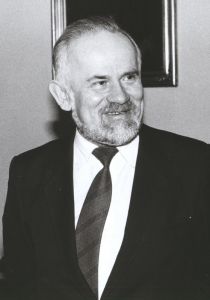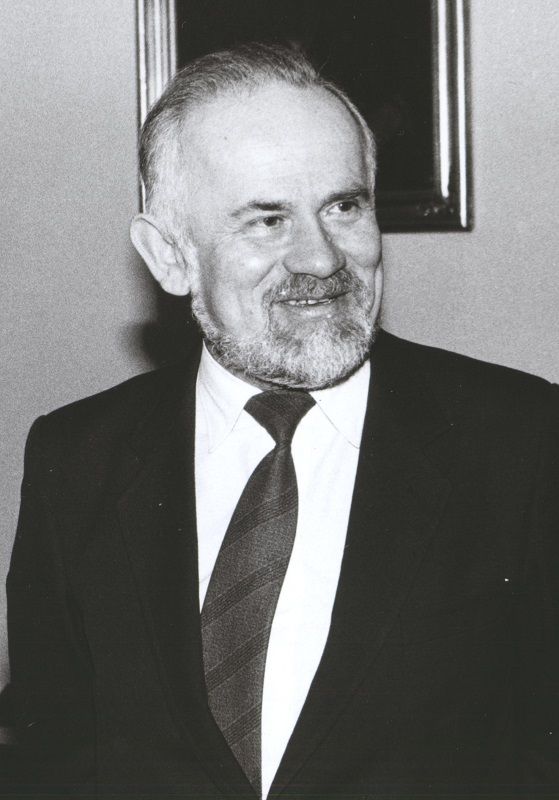Bujarski Zbigniew
-
composer
composer, b. 21st August 1933 in Muszyna; d. 13th April 2018 in Krakow. He studied conducting (1955-58), and composition with Stanisław Wiechowicz (1956-60) at the State Higher School of Music in Cracow.
In 1959-61 he worked as an editor for the PWM Polish Music Publishers in Cracow, and in 1961-67 as a music presenter and editor in the Rzeszów Philharmonic. Since 1972 he has been on the faculty of the Music Academy in Cracow. In 1978-86 he was dean of the Department of Composition, Conducting and Music Theory. Since 1992 he has held the post of professor of composition in that academy.
Bujarski's compositions have been awarded in numerous competitions. In 1961 he received an honourable mention at the Young Composers' Competition of the Polish Composers' Union for Zones for symphony ensemble (1961), and in 1964 - 2nd prize in the Grzegorz Fitelberg Competition for Composers in Katowice for his Kinoth for chamber orchestra (1963). In 1967 his Contraria for symphony orchestra (1965) received an honourable mention, and in 1978 his Musica domestica for 18 string instruments (1977) was one of the recommended works at the International Rostrum of Composers in Paris.
Zbigniew Bujarski has twice been granted the Minister of Culture and Arts Award, Second Class (1979, 1987), as well as the Award of the Polish Composers' Union and the City of Cracow Award (1984). In 1991 he received the American Alfred Jurzykowski Foundation Award. In 2011 he was awarded the "Gloria Artis" Silver Medal for Merit to Culture by the Minister of Culture and National Heritage.
Creation
Zbigniew Bujarski is a composer endowed with an extraordinarily subtle music sensitivity, which may be one of the reasons why he has dedicated so much attention to the composition of string quartets. The homogeneous sound of the four string instruments enhances compositional subtleties and allows for sublime sound effects. The intimate nature of the quartet form evokes an atmosphere of concentration, whereas the limited expressive means presented by the four instruments and the classical quartet form encourage composers to penetrate into the inside of sound and into the depth of formal structure. This seems to be Zbigniew Bujarski’s natural environment with respect to both form and sound. He wrote 4 string quartets with suggestive titles: For the Opening of the House (1980), For Advent (1984), For Easter (1989), For the Autumn (2001). In the context of the performance of that last quartet at the 2002 International Music Days of Cracow Composers, Bujarski commented:
“The Quartet for the Autumn is my fourth, and so far my last, string quartet, though I hope to write another - a Quartet for Christmas. Most probably, after the completion of a great symphonic work, time will come again - as it also happened many times before - for a return to greater intimacy, “privacy”, which I most willingly express through a small ensemble. The form of a string quartet is a kind of private letter that the composer writes to a specified addressee, and I also similarly perceive the quartet music written by other composers - as private correspondence in sounds between individual persons. This extremely personal music, as well as the high technical demands that the string quartet places on the composer, greatly appeal to me and I will remain faithful to it for as long as I live.”
The Quartet for the Autumn was written for the 80th birthday of Mieczysław Tomaszewski, to whom it is dedicated. It was first performed at the anniversary concert in the “Florianka” in Cracow on 17th November 2001 by the “Dafô” Quartet.
Compositions
- Burning Bushes [1st version], 3 songs for voice and piano (1958)
- Burning Bushes [2nd version], 3 songs for voice and chamber ensemble (1958)
- Triptych for string orchestra and percussion (1958)
- Synchrony I for soprano and chamber ensemble (1959)
- Synchrony II for soprano, mixed choir and symphony orchestra (1960)
- Zones for symphony ensemble (1961)
- Kinoth for chamber orchestra (1963)
- Chamber Music Composition for voice, flute, harp, piano and percussion (1963)
- Contraria for symphony orchestra (1965)
- El Hombre, oratorio for solo voices (soprano, mezzo-soprano, baritone), mixed choir and orchestra (1969-73)
- Musica domestica for 18 string instruments (1977)
- Concerto per archi for solo violin and string orchestra (1979)
- Similis Greco I for symphony orchestra (1st part of the Similis Greco cycle) (1979)
- Quartet for the Opening of the House for string quartet (1980)
- Nativity for mixed choir and symphony orchestra (3rd part of the Similis Greco cycle) (1981)
- Veni Creator Spiritus for organ (1983)
- God Will Give Us One Day, a song for baritone and piano to words by Jan Lechoń (1983)
- Quartet for Advent for string quartet (1984)
- Gardens a song cycle for soprano and orchestra (1987)
- Veni Creator Spiritus for symphony orchestra (1988)
- Quartet for Easter for string quartet (1989)
- Concerto per archi II for solo cello and string orchestra (1992)
- Birds’ Fear for violin, viola and percussionist (1993)
- Scolaresca for string orchestra (1993)
- Pavan for “The Remote One” for string orchestra (1994)
- Birds’ Fear II for 2 clarinets and percussion (1994)
- Five Songs for soprano, string orchestra and vibraphone (1994-96)
- Birds’ Fear III for clarinet, bass clarinet, violin, viola and percussion (1995)
- Cassazione per Natale for chamber wind ensemble and percussion (1996)
- Per cello for solo cello (1996)
- Lumen for symphony orchestra (2nd part of the “Similis Greco” cycle) (1997)
- La Danza per “Aukso” for chamber string orchestra (1998)
- Alleluiah for mixed choir, string orchestra, two trumpets and percussion (1999)
- Stabat Mater na chór mieszany i orkiestrę symfoniczną (2000)
- String Quartet “For the Autumn” (2001)
- Bagatelle for string orchestra (2001)
- Orniphania for cello and piano (2001)
- Frutti di Marek for cello, accordion and piano (2001)
- Peirene for symphony orchestra (2003)
- Daybreak songs for mezzo-soprano and string orchestra (2004)
- Elegos, funeral song for cello solo and string orchestra (2004-2005)
- Games for orchestra (2006)
- To the Space for symphony orchestra (2009)
- KalSzlez for cello and piano (2010)
- Largo for two cellos and viola (2013)
- Adagio for two cellos (2013)
Literature
Perkowska Małgorzata, Bujarski Zbigniew, In: PWM Music Encyclopaedia (biographical part ed. by Elżbieta Dziębowska) [Encyklopedia Muzyczna PWM (część biograficzna pod red. Elżbiety Dziębowskiej)], PWM, Kraków 1979
Malecka Teresa, Zbigniew Bujarski’s Music World - The Songs [Świat muzyki Zbigniewa Bujarskiego. Twórczość pieśniowa], In: Cracow School of Composers 1888-1988 [Krakowska Szkoła Kompozytorska 1888-1988] (ed. by Teresa Malecka), Akademia Muzyczna w Krakowie, Kraków 1992
Małecka-Myślik Magda, Rodem z Muszyny: „Nie znoszę festiwali”, rozmowa ze Zbigniewem Bujarskim, „Almanach Muszyny” 1993
Malecka Teresa, Rejuvenating Tradition in the Music of Zbigniew Bujarski [Odnawianie tradycji w muzyce Zbigniewa Bujarskiego], In: Polish Music 1945-1995 [Muzyka polska 1945-1995 ] (ed. by Krzysztof Droba, Teresa Malecka, Krzysztof Szwajgier), Akademia Muzyczna w Krakowie, Kraków 1996
Widłak Elżbieta, Bujarski Zbigniew, In: PWM Music Encyclopaedia (biographical part ed. by Elżbieta Dziębowska) [Encyklopedia Muzyczna PWM (część biograficzna pod red. Elżbiety Dziębowskiej)], PWM, Kraków 1998
Malecka Teresa, The Sphere of Inspiration in the Work of Zbigniew Bujarski, or the History of an Independent Artist [Sfera inspiracji w twórczości Zbigniewa Bujarskiego czyli historia artysty niezależnego], In: Musicology in the Face of Cultural and Civilisational Changes [Muzykologia wobec przemian kultury i cywilizacji] (ed. by L. Bielawski, K. Dadak-Kozicka, A. Leszczyńska), Związek Kompozytorów Polskich, Warszawa 2001
Malecka Teresa , Zbigniewa Bujarskiego "Stabat Mater" na koniec wieku, "Saeculum Christianum: pismo historyczno-społeczne", 2002 nr 9/2
Malecka Teresa, Zbigniew Bujarski. Composer - Painter [Zbigniew Bujarski. Kompozytor - malarz], In: Studies in the Philosophy of Music [Filozofia muzyki. Studia] (ed. by Krzysztof Guczalski), Musica Iagellonica, Kraków 2003
Janicka-Słysz Małgorzata, Rozmowy z kompozytorem, w ramach spotkań z wybitnymi twórcami, organizowanych przez Koło Naukowe Studentów Teorii Muzyki, Akademia Muzyczna, Kraków 2003
Kowalczyk Marcin, Istotą muzyki jest synteza, rozmowa ze Zbigniewem Bujarskim, „Kwarta” 2003 nr 12
Świstak Aleksandra, Zbigniew Bujarski. Katalog tematyczny utworów, Akademia Muzyczna w Krakowie, Kraków 2005
Malecka Teresa, Zbigniew Bujarski. Twórczość i osobowość, Akademia Muzyczna w Krakowie, Kraków 2006
Chopinspira. Współcześni kompozytorzy polscy o Chopinie, Warszawa 2009
Tomaszewski Mieczysław, W zadziwieniu i zadumie nad „pokoleniem 33", „Teoria Muzyki: Studia Interpretacje Dokumentacje”, 2013 nr 3
Pawłowska Małgorzata, Oblicza sonoryzmu we wczesnej twórczości Zbigniewa Bujarskiego, "Teoria Muzyki" (Akademia Muzyczna w Krakowie) 2014 nr 5











